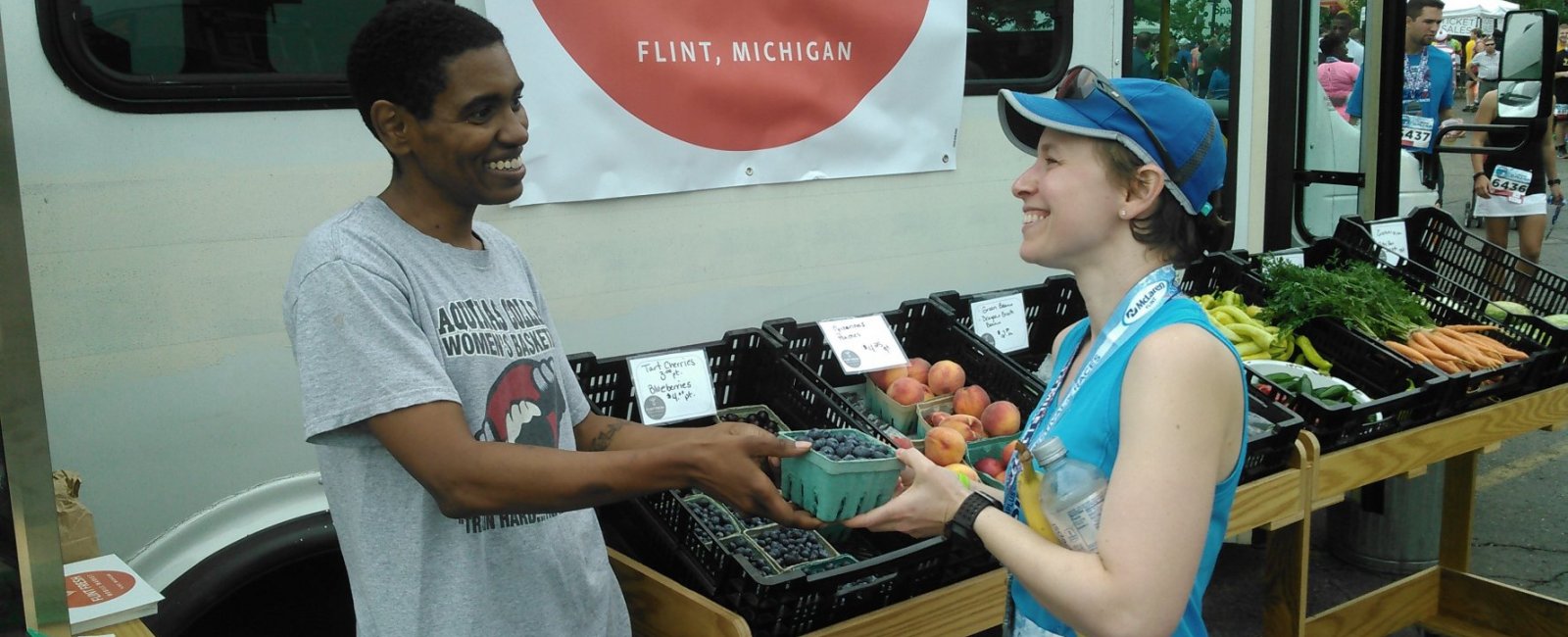From water crisis to food sovereignty
Takeaways
- Genesee County, Michigan and the city of Flint experienced a historic economic shift resulting in rapid population decline, high unemployment, high rates of poverty and negative health outcomes.
- During the water crisis, the population was exposed to an urgent public health emergency with lifelong consequences.
- This crisis helped galvanize community health organizations focused on food work, breaking down silos and aligning needs with opportunity.
- A collaborative community health needs assessment process revealed that the underlying top community health needs — obesity, diabetes, overweight, even the Flint water crisis — was food insecurity.
- Genesys invests in efforts to address food security at a number of levels. Genesys also advises and participates in the Regional Food System Navigation initiative, an effort led by the Community Foundation of Greater Flint. These investments and efforts resulted in several collaborative community projects including:
- The Women in Agriculture Farm Development Center
- Genesee County Food Rescue Program
- Flint Family Summer Nutrition Program
- Flint Fresh Mobile Market
- Flint Fresh Veggie Boxes
- Nutrition in Community program
- Efforts have impacted the community, increasing healthy food access:
- 1,184 pounds of food from the local high school was rescued and redistributed to more than 330 families in need.
- The summer nutrition program distributed 3,000 food boxes, providing over 78,000 nutrient-rich meals focused on lead-mitigating foods such as fruits and vegetables to community members in need.
- Hospital name: Genesys Regional Medical Center
- Hospital type: Private, nonprofit
- Hospital size: Large (400 beds)
- Geographic area: Urban
- System/Network: Genesys Health System; member of Ascension Health
- Network coverage: Mid-Michigan
- White: 74.5%
- African American: 20.7%
- Hispanic/Latino: 3.0%
- Community health needs assessment region: Genesee County, Michigan
- Population: 412,895
Adult obesity: 35.7%
Adult overweight: 34.7%
Diabetes: 11.6%
Adult high cholesterol: 42.41%
Food insecurity rate: 18.02%
Poverty: 21.7% in Genesee County, 41.1% in Flint
Unemployment: 5.4% Genesee County, 9.7% Flint
Genesys Regional Medical Center serves the residents of Genesee County, Michigan, and its urban core, the city of Flint. Located 70 miles north of Detroit, Genesee County is the birthplace of General Motors (GM) and was once the national epicenter of automotive production. In the late 1970s, GM employed more than 80,000 workers in Genesee County. National deindustrialization — beginning in the 1980s — and a rapid decline of the automotive industry led to a period of disinvestment. By 2010, less than 8,000 GM jobs remained in the county.
This historic economic shift led to high unemployment and rapid population decline. Nearly 200,000 people lived within Flint during its peak in the 1960s and 1970s; today only 99,002 residents remain, 56.6 percent of whom are African American. Out-migration led to urban decay, neighborhood blight, decreased home values, and falling tax revenues. Poverty rates in Flint and Genesee County are much higher than state and national levels, and the percent of households receiving public assistance exceed state and national benchmarks. Consistently high unemployment rates and growing intergenerational poverty have contributed to poor community health factors and health outcomes.
Residents in the city of Flint, particularly those who are low-income or minority, are disproportionately impacted by social, economic and environmental factors such as pollution, crime, property abandonment, neighborhood blight, and lack of access to healthy foods. These factors have led to significant disparities in life expectancy, health outcomes and health status among low-income and minority populations in the community.
In April 2014, the city of Flint switched its water supply source as a cost-savings measure under the direction of a state-appointed emergency manager. As a result, a series of water contamination problems occurred culminating with lead leaching into public drinking water. Nearly 100,000 residents may have been exposed to high levels of lead before a state of emergency was finally declared in January 2016. Between 6,000 to 12,000 children were likely exposed to lead through Flint’s water supply. Childhood lead poisoning has serious health consequences and disproportionately affects vulnerable children and pregnant mothers. Lead poisoning is irreversible and affects many developmental and biological processes. Lead exposure is linked to lowered IQ (intelligence), reduced academic achievement, behavior problems such as Attention Deficit Hyperactivity Disorder (ADHD), lack of impulse control, aggression, and more. The Flint Water Crisis will have lifelong, multi-generational consequences.
Today Flint and the Genesee County is a “community in recovery.” The Greater Flint area has a long history of ingenuity and grit. Strong community, citizen, and institutional leadership are dedicated to building a healthier, vibrant community. Over time this leadership has successfully developed infrastructure to support the alignment of diverse community-based partners around a shared community health agenda. This framework and commitment to collectively address community health challenges is a national model for coordinated community change and a valuable community asset.
Community health needs assessment: Priorities and process
- Food and diet-related disease priorities
- 2016 CHNA - Obesity, overweight, and healthy lifestyles
- 2016 CHNA - Food insecurity
- Participation from food-based organizations in CHNA process
- Edible Flint, Flint Farmers Market, Food Bank of Eastern Michigan, North End Soup Kitchen and other food-related organizations participate in the Greater Flint Health Coalition, which engaged partners throughout the CHNA process.
- How/why did food issues emerge as a priority?
- The community has worked on food system initiatives for years, but not in a coordinated or systematic way. CHNA data demonstrated an imperative to directly address food insecurity as a fundamental determinant of health underlying numerous priority health needs. Community input was confirmed.
- Key community indicators
- Adults with inadequate fruit/vegetable consumption: 81.6%
- Overweight adults: 34.7%
- Obese adults: 35.7%
- Food insecurity rate: 18.02%
- Households receiving SNAP benefits: 23.55% Genesee County, 43.09% Flint
- Children eligible for free/reduced price lunch: 55.37% Genesee County, 86.54% Flint
- Low-income population with low food access: 9.41% Genesee County, 9.68% Flint (6.05%MI)
Full assessment: Community Health Needs Assessment Report 2016
Assessing health needs — and how to meet them
Community health needs assessment process
Genesys Health System is a group of affiliated medical campuses, outpatient centers, primary care locations and ancillary health care organizations in central Michigan. Genesys is anchored by Genesys Regional Medical Center at Health Park and is a member of Ascension, the largest nonprofit health system in the United States and the world’s largest Catholic health system.
As one of three local hospital systems serving Genesee County, Genesys Health System comes together in partnership with Hurley Medical Center, McLaren Flint hospital, and the Greater Flint Health Coalition (GFHC) to complete a collaborative community health needs assessment (CHNA) for the city of Flint and Genesee County area.
Established in 1996 the GFHC is a broad cross-sector collaboration between Flint and Genesee County’s leadership in public health, health care, business, education, government, community organizations, committed citizens and more. Greater Flint Health Coalition works together to improve the health status of Flint and Genesee County residents by establishing a common health agenda, shared measurement systems, mutually reinforcing health activities, and continuous communication regarding the well-being of the community and its residents.

Genesys Health System is a founding member of the GFHC, serves on the Board of Directors, and participates in strategic subcommittees. Genesys leveraged GFHC’s existing infrastructure, networks, and processes for facilitating ongoing cross-sector community engagement in community health by partnering with them for their collaborative CHNA.
Many community organizations working on food system initiatives such as Edible Flint, Flint Farmers Market, Food Bank of Eastern Michigan, and North End Soup Kitchen are GFHC partners, thus becoming involved in CHNA related activities through association. Greater Flint Health Coalition partners participated in the CHNA process in various ways, including providing input relative to metrics, data interpretation, health needs, and priorities.
The joint CHNA used the GFHC’s Community Data Scorecard, a cross-sector project that includes over 400 health-related indicators with an emphasis on social, environmental and economic determinants of health. Issues such as food insecurity, obesity, overweight, and healthy lifestyles were identified as significant community health needs under this framework. The CHNA also included a community health survey that asked residents about eating habits, food insecurity, healthy food access, and diet-related diseases. Survey responses reinforced quantitative data trends.
The community had engaged in food systems work for many years, however efforts were siloed, disjointed, or proprietary. This fragmented approach led to missed funding opportunities for healthy food access initiatives. The community health needs assessment process and strong ongoing cross-sector community engagement therein revealed the need to take a more coordinated and collaborative approach. It also highlighted the importance of focusing explicitly on food issues rather than continuing to address food as an element of chronic disease initiatives.
Investing in solutions
Implementation strategy
Genesys Regional Medical Center has invested staff time and in-kind resources such as grant writing support, land, facility space and clinical expertise in a range of strategies and programs that promote healthy lifestyles and access to healthy food.
Genesys Regional Medical Center uses a decentralized model and takes a regional approach to organizing community benefit and community health activities. Community benefit work is organized under the mission integration department. One local community benefit coordinator oversees the work across four hospitals in the mid-Michigan region with oversight from the vice president of mission integration and support from a local community benefit team. Community health needs assessments and implementation strategies are developed by a team of clinical and operational staff to tailor a health system program response to meet identified community health needs.

Genesys partners with the GFHC and local businesses to implement Commit to Fit – a community-wide health behavior improvement initiative focused on increasing healthy eating and physical activity among citizens through education, shared messaging and engagement in no-cost healthy living programming. To improve community access to their Diabetes Nutrition Learning Center, Genesys is training more diabetes prevention program providers and increasing community outreach and program availability. The goal of these efforts is to increase knowledge and adoption of healthy behaviors that will help mitigate or delay progression of obesity and diet-related diseases.
In 2015 Genesys partnered with Michigan Food & Farming Systems (MIFFS) to provide a community-based resource sharing and education center focused on providing economic opportunity to women farmers and promoting access to healthy food in the community. Genesys also works to create an equitable, sustainable regional food system by advising and participating in the Regional Food System Navigation (RFSN) initiative, an effort led by the Community Foundation of Greater Flint (CFGF) to improve healthy food access through resource coordination and collaboration.
Women in Agriculture Farm Development Center
Provides education and support for beginning women farmers to achieve viable farming careers and promotes increased access to healthy food.
- Program type: Training and resource center for new farmer development
- Program administrator: Michigan Food and Farming Systems
- Program founded: 2015, farm operations initiated in 2016
- Hospital role: Provide use of hospital land, facilities and equipment; provide staff support for program coordination, grant writing, marketing, and facilities management.
- Community partners: Michigan State University (MSU) Extension, MSU Center for Regional Food Systems (CRFS), MIFFS, Genesys Farmers Market, Flint Fresh, MSU Student Organic Farm, Community Foundation of Greater Flint, USDA-Natural Resources Conservation Services (NRCS).
- Population served: Beginning and historically underserved women farmers in Genesee County and community members in need of fresh produce, especially to mitigate the impact of lead exposure.
- Program goals: Support women who are beginning a farm business by providing resources and reducing barriers to becoming economically independent farm business owners. Support access to healthy food in the community.
- Health needs addressed: Food insecurity
- Key outcomes: Since April 2016, 2,611 pounds of food has been produced and distributed within the community, 14 trainings have been conducted, approximately 150 pounds of Genesys food preparation waste has been diverted per week, and eight women are newly growing and selling or actively working towards this milestone.

Project description
The Women in Agriculture (WIA) Farm Development Center is an incubator farm located on the Genesys Health System Campus where beginning women farmers receive education and experience on starting and sustaining a farming business. The goal is for these women to become successful farm business owners.
A farm incubator is a multi-grower project that provides training and technical assistance to aspiring and beginning farmers. Like traditional business incubators, farm incubators help new farm entrepreneurs establish successful businesses by providing resources and services that are difficult for them to access on their own.
The Women in Agriculture program is managed by Michigan Food and Farming Systems (MIFFS), a nonprofit that connects beginning and historically underserved farmers to resources and opportunities. The program began in 2014 after a small group of women farmers inquired as to what MIFFS was doing to help female farmers in Michigan. With a small grant from Michigan State University Center for Regional Food Systems, MIFFS explored how to engage female food producers in the Greater Flint region and developed the Women in Agriculture Network pilot.
Following the pilot, MIFFS approached Genesys Health System to host a farm development center which would deliver healthy food throughout the region and serve as an economic development opportunity. Today the WIA Farm Development Center occupies three acres of the Genesys Health Park Campus. A farm manager grows crops on-site 9-10 months out of the year, with an initial focus on foods that mitigate the effects of lead exposure given the urgent need resulting from the Flint Water Crisis.
Nutrition and lead poisoning
Healthy eating can protect the body from the harmful effects of lead. Consuming foods high in calcium, iron and Vitamin C and eating regularly to avoid an empty stomach can minimize the amount of lead absorbed by the body and mitigate the effects of lead poisoning.
Produce from the farm is sold through community sites such as the Genesys Farmers Market, Flint Fresh Mobile Market and Veggie Box, The Local Grocer, University of Michigan (UofM) Early Childcare Center, and Genesee Intermediate School District. Imperfect, yet still safe and nutritious produce is donated to community organizations serving populations in need. This increases access to healthy food and reduces food waste - a significant source of methane (a greenhouse gas).

The Women in Agriculture Network meets 5-7 times per year for peer-to-peer learning and support. Based on training needs identified during these meetings, MIFFS works with experienced WIA farmers, Michigan State University Student Organic Farm and MSU Extension to develop and deliver workshops that support new farmers. In addition, women can procure their own space for production and gain hands-on experience by working alongside the WIA farm manager.
The farm manager connects local farmers with resources and support programs, such as Department of Agriculture Farm Bill initiatives offering financial assistance for nutrient management, environmental stewardship, hoop houses for season extension, etc. These programs are a major fund source for farmers but are historically difficult to access.
“[Just] having that EQIP [Environmental Quality Incentives Program] cost share and not having to pay for your hoop house up front enables people to start businesses that otherwise wouldn’t have those opportunities,”
— Jen Silveri, Michigan Food and Farming Systems director of field operations
Environmental stewardship is a priority on the farm, which is verified through the Michigan Agriculture Environmental Assurance Program. The Women in Agriculture farm manager works closely with the local USDA-Natural Resources Conservation Services (NRCS) office and Conservation District to implement best practices for natural resource management and environmental conservation. A part-time technician manages farm compost and the on-site vermiculture composting project and also conducts compost-related community outreach and education. The farm recently developed a pollinator project. In the future MIFFS hopes to conduct more environmentally-focused education on site and would like to connect the farm with their Veterans in Agriculture network.
Vermiculture
Vermiculture composting or Vermicomposting is the process of using the digestive power of earthworms to convert organic material such as food waste into rich soil full of nutrients and beneficial microorganisms (called ‘vermicompost’). Vermicomposting reduces the amount of garbage entering landfills, saves energy and water, reduces the need for synthetic fertilizers, and helps build healthy soil. When added to soil, vermicompost boosts the nutrients available to plants; improves soil structure, drainage, water retention, and more. Plants can grow bigger and stronger and better resist plant diseases and insect attacks.
Program participation
Michigan Food and Farming Systems recruits participants for the WIA program, with a focus on reaching out to members of low-income and vulnerable communities. The broader community benefits from increased access to nutrient-rich fresh produce.
Partnerships and hospital role
Genesys has played a critical role in the partnership by providing three acres of land for the farm and staff support for farm operations. This partnership allowed MIFFS and MSU CRFS to apply for and receive a USDA Beginning Farmer grant in 2015. A letter of support from Genesys was “integral to securing funding” according to Silveri.
“We know that if we want people to be healthy, we have to create ways for them to access healthy food. While we're not leading the effort on the farm, one of the contributions as a large health system that we can make is to provide the space for the people that are doing the work to accomplish that goal.” — Karen VanCura, Genesys Health System director of volunteer services
Genesys also provides:
- Hospital grounds/maintenance staff time to support farm infrastructure and maintenance;
- 25 percent of the Genesys Greenhouse Manager’s time to coordinate activities and support the needs of both the farm and the health system;
- Meeting space for the WIA Network and use of the Genesys greenhouse for demonstrations and events;
- Pre-consumer food waste from the hospital kitchen for the farm’s vermicompost system;
- Health system and hospital foundation staff time for public relations, fundraising, and networking support.
Michigan Food and Farming Systems manages all aspects of farm operations and the WIA Network. The Women in Agriculture Farm Development Center would not be possible without MIFFS’ leadership, program coordination, and network of community partners. Strong partnerships with community organizations and agencies play a key role in almost every aspect of the WIA farm and programming, including: funding proposals; curriculum development and workshop implementation; community education, outreach and network development; technical assistance; implementation of environmental stewardship practices at the farm; produce distribution and sales; and strategic development.
Financing
Initial funds for the WIA Farm Development Center came from CFGF and subsequently through a partnership with MSU Center for Regional Food Systems on a USDA Beginning Farmer and Rancher Development grant in 2015. Funding for activities such as farmer trainings, educational programming, and resource connection assistance is provided by a USDA Specialty Crop Block Grant and USDA 2501 Socially Disadvantaged Farmer Rancher Grant, both awarded to MIFFS.
A contract with the Michigan Department of Health and Human Services (MDHHS) provides significant support for the farm and WIA programming. MDHHS’ WISEWOMAN Entrepreneurial Gardening Program provides at-risk women with preventative screening, nutrition counseling, and gardening education. Michigan Food & Farming Systems pairs WISEWOMAN gardeners with established farmers from the WIA Network to provide mentoring on running an income-generating garden.
A business plan for the farm to become self-sustaining is under development. Michigan Food & Farming Systems continues to look for innovative partnerships to diversify funding streams and plans to explore opportunities to incorporate fee-for-service activities that make use of the program’s assets (such as network development, facilitation services, and more).
Program evaluation and impacts
Still in early phases of implementation, evaluation is one area leadership is working to improve. Michigan Food & Farming Systems staff members track: pounds of food produced, partnerships created, people reached through farm activities, educational sessions offered and participation, number of women producers growing for sale, and amount of land in cultivation. Genesys measures pounds of pre-consumer food preparation kitchen waste diverted from the landfill to the farm’s vermiculture compost system.
Ongoing feedback regarding program activities is a priority to ensure the program is responsive to the needs of their members and community. Michigan Food & Farming Systems uses brief participant surveys to evaluate each educational session and WIA network event.
As their first USDA grant term comes to an end, MIFFS is currently working on data aggregation and analysis. Preliminary findings indicate, since April 2016:
- 2,611 pounds of food produced & distributed within the community
- 622 volunteer hours logged
- 14 trainings conducted
- 4 women newly growing and selling food, 4 more actively working toward this milestone
- Approximately 150 pounds of Genesys food preparation waste diverted per week
Future plans for evaluation include more robust efforts to measure a number of participant impacts including improved understanding of the connection between nutrient-rich fresh foods and health outcomes; improved farming knowledge and growing skills; expanded social and workforce network.
Lessons learned
“No one organization can make an impact on access to healthy food….This project really is a collaborative effort with all different kinds of expertise to create the environment in which we can provide access to and consumption of healthy foods and promote healthy populations.”
— Susan Tippett, Genesys Health Foundation director of grant procurement.
On the practical side, a key lesson MIFFS learned was the importance of site assessment. “Farmers get offered free land a lot. And free land is never free. There’s a lot that has to go into planning a farm,” explains Jen Silveri. Infrastructure development, water and electrical connectivity, soil composition, wind, drainage, public interaction, and accessibility - these are all important factors to seriously consider before setting up shop as each can present a unique challenge that could be costly and potentially offset any benefit of "free land."
Genesys staff members highlight the importance of communication, patience, and alignment when working with partners. Tippett explains that “good communication takes due diligence on the part of all those involved in order to go where you need to be.” Developing and maintaining a trusting, genuine relationship with MIFFS has been a priority and key to success. Genesys meets regularly with MIFFS to discuss how they can collectively work to achieve their goals.
Andy Kruse, vice president of mission integration, emphasizes the importance of taking the time to explore goals and priorities, determine areas of alignment, establish shared outcomes, and having patience with the process required to get there. Patience is essential. Community works differently than hospital operations. Kruse explains that when working with other organizations, “you have to work at their pace.” Trust, strong communication, and a solid working relationship are critical for navigating “how organizations remain patient with each other.”
Regional food system navigation
Brings together stakeholders to link, leverage, and align resources and work collaboratively toward an equitable, sustainable regional food system in Genesee County.
- Program type: Regional food system advocacy
- Program administrator: Community Foundation of Greater Flint
- Program founded: 2014
- Hospital role: Participate in a community collaboration, provide staff support for program evaluation, provide staff support to serve on the advisory committee that supports program implementation and securing funding.
- Community partners: MSU School of Public Health, Hurley Medical Center, Food Bank of Eastern Michigan, MSU Extension, Edible Flint, Genesee County farmers/growers, many other community-based organizations.
- Population served: Flint/Genesee County consumers in need of healthy food and fresh produce, especially to mitigate the impact of lead exposure. Key food system stakeholders including growers, producers, processors, distributors, preparers, and retailers.
- Program goals: Create an equitable, sustainable food system in Genesee County through strategic partnerships among diverse stakeholders, intentional stewardship of resources, program and service coordination, collaborative planning, and alignment of funding to achieve collective and sustainable regional impact on healthy food access/consumption and population health outcomes.
- Health needs addressed: Food insecurity
- Key outcomes: Improved communication and collaboration among key stakeholders; integrated the local food system into the City of Flint’s Master Plan; secured new grant funding; launched numerous projects to increase healthy food access including Flint Fresh Mobile Market, Flint Fresh Veggie Box Program, Genesee County Food Rescue Program, Flint Family Summer Nutrition Program, Nutrition in Community (NIC) program pilot, and new Food Hub under development.

Project description
The Regional Food System Navigation (RFSN) program serves as a venue to coordinate food system initiatives to achieve access to healthy food for all community members throughout the Genesee County region, especially those who experience geographic, economic, and informational challenges to healthy eating. Spearheaded by CFGF, this collaboration developed in response to a long-recognized need in the community that many residents experience food insecurity due to lack of access to grocery stores with fresh foods, especially in low-income communities; and that food system stakeholders (growers, producers, processors, distributors, preparers and retailers) needed a systemic process to leverage their individual resources to achieve shared community benefit.
Michigan is the second most agriculturally diverse state in the country. As such, many key food system stakeholder groups exist within the region, including growers and producers, processors, distributors, food preparation entities, retail, and consumers. Genesee County is also home to numerous groups and organizations working to promote food access and healthy eating.
Historically however, these food system stakeholders and organizations working to address food insecurity were siloed, without a mechanism to collaborate towards shared goals. This environment led to unintended consequences ranging from dissatisfaction among customers, to limited procurement of food system funding, limited food business opportunities for marginalized communities and non-traditional initiatives, and ultimately increased rates of chronic diseases and related health care costs in Genesee County.
Community Foundation of Greater Flint (CFGF) examined the local landscape of food insecurity as part of its strategic planning process. Working with key community leaders, they recognized the need for an entity to serve as a navigator to make connections between food system stakeholders and foster cohesive interaction.
With support from strategic stakeholders such as Genesys, CFGF launched the RFSN initiative and hired a food system navigator to improve communication and collaboration among key stakeholders, and facilitate a coordinated community-wide approach to creating a healthier regional food system.
“The food system navigator has been linking together all of these different groups in health care, education, the growers and producers, folks that are in retail, so that we have better connections and can really start to form a regional food system and address the needs of people in our community.”
– Susan Tippett, Genesys Health Foundation director of grant procurement.
The Regional food system navigator established:
- A task force of leaders from often siloed sectors such as government, education, health care, private sector, and nonprofit; and
- Five action teams bring together key community stakeholders to address each area of the food system: growing and producing, processing and distribution, preparing and eating, retail and engagement.
The task force created a shared framework and each action team developed a coordinated plan to improve access to and consumption of healthy food and help better meet community needs.
As each action team prepared to implement initiatives, the Flint water crisis occurred. The Regional Food System Navigation focus shifted to address the immediate need to improve access to lead mitigating healthy foods. Regional Food System Navigation provided a framework for coordinating and mobilizing cross-sector community stakeholders around a common goal to meet an urgent need in a timely manner. Moreover, the RFSN infrastructure empowered stakeholders to effectively use incoming resources and strategically respond to funding opportunities.
During its first two years, the Regional Food System Navigation program initiated five projects, including:
- Genesee County Food Rescue Program: Reclaims good food and redistributes via partnerships with local organizations. Rescued 1,184 pounds of food from the local high school between October 2015 to June 2016 and redistributed through a community emergency resource center, serving more than 330 families in need.
- Flint Family Summer Nutrition Program: Coordinated and distributed 3,000 food boxes, providing over 78,000 nutrient-rich meals with a focus on lead-mitigating foods such as fruits and vegetables- to community members in need between June to August 2016 (when school is not in session).
- Flint Fresh Mobile Market: A collaborative initiative of local organizations that foster health and wellness through fresh local food and community outreach. The mobile market aggregates fresh food from 12 to 15 local farmers and visits 9 to 10 neighborhood sites weekly to increase access to fresh, healthy foods. The market accepts Supplemental Nutrition Assistance Program (SNAP) benefits and participates in the Double Up Food Bucks program, so each dollar spent goes twice as far.
- Flint Fresh Veggie Boxes: Approximately 80 boxes of local produce, aggregated from 20 to 25 farms, is delivered weekly to Flint residents.
- Nutrition in Community program (NIC): Pilot program pairs local Latina residents with nutrition educators to share traditional dishes and to make small changes and transform recipes into healthier versions while maintaining flavor and cultural relevance.
Program Participation
Anyone interested in increasing access to and consumption of healthy food in Genesee County is invited and welcome to participate in the RFSN initiative. This includes consumers, producers, distributors, processors, businesses, waste management, educators, health care workers, social justice workers, advocates, social workers, current food practitioners and more.
Partnerships and hospital role
Spearheaded by the Community Foundation of Greater Flint (CFGF), the Regional Food System Navigation (RFSN) initiative is a collaboration involving Michigan State University (MSU) School of Public Health, Genesys Health System, Hurley Medical Center, Food Bank of Eastern Michigan, Edible Flint, and a large network of community-based organizations and Genesee County farmers/growers.
Partnerships with local colleges and universities such as University of Michigan School of Public Health-Flint and the Michigan State University School of Public Health, have been crucial to support evaluation for discrete RFSN projects.
According to Artina Sadler, current food system navigator, the involvement of Genesys staff in preliminary community conversations helped drive the development and launch of this initiative. Genesys continues to play a critical advisory role.
Genesys contributes staff time to serve on the advisory committee and participate in the RFSN task force in a coordination role, and helped develop priorities for each of the five action teams. Genesys staff is also involved in facilitating regional food system data collection and evaluation of coordinated outcomes to quantify impacts of the RFSN initiative. In addition, Genesys provides technical assistance to support activities such as grant proposal development.
Financing
Community Foundation of Greater Flint (CFGF) provides funding for a full-time food system navigator and coordinates activities of the RFSN task force and action teams. The navigator has discretion over a portion of CFGF health-focused grantmaking to support community projects.
The Regional Food System Navigation project secured a four-year grant from CFGF, the first ever multi-year grant awarded by the foundation during its 30 year existence. Sadler attributes this accomplishment to the advocacy of Andy Kruse, vice president of mission integration for Ascension Mid-Michigan, who convinced the funding committee that the nature of collaborative community work would make it nearly impossible to have any real impact in just one or two years.
External grant funding supports projects that emerge from the RFSN work. Funders include: Michigan Health Endowment Fund, Blue Cross Blue Shield Network of Michigan, Tide Foundation, Labatt Blue, and Michigan Department of Education.
The greatest ongoing cost of this model is the navigator position (approximately $68,000 per year). In-kind time of community stakeholders to participate in the task force and action teams is crucial and translates to low overhead and ongoing costs to support the initiative. The hope is that with an organized central forum for communication and collaborative planning, partners will develop stronger proposals and leverage more funding streams to support future projects.
Additionally, a core objective of the model is to build upon existing resources and increase impact through improved program and service coordination and alignment of funding. Sadler knows she has four years to make an impact. Ensuring projects can be self-sustaining is a top priority. Each RFSN project has a business plan and the task force is now working with a consultant to develop a detailed accounting of project costs to examine financial sustainability of the RFSN model and accurately demonstrate return on investment.
Program evaluation and impacts
The goal of the RFSN initiative is to create an equitable, sustainable food system in Genesee County. This is being achieved through strategic partnerships among diverse stakeholders; intentional stewardship of resources; program and service coordination; and aligned, leveraged funding aimed at achieving collective and sustainable regional impact on healthy food access and consumption, and ultimately improved population health outcomes.
The Regional Food System Navigation task force recently hired an evaluation consultant and is working to define coordinated outcomes, develop impact indicators and an overall evaluation framework. The initiative was launched during a state of emergency with the Flint water crisis. As a result, efforts focused on delivery of resources and services to the community. Now, they can step back and look at how to capture impacts and develop a plan to measure outcomes and program costs to inform decision making and strategic development.
The task force established process indicators to track early progress and results. Initial milestones included: officially establishing the RFSN model and navigator as a full-time position (initially part time); securing formal partnership agreements from key institutions and organizations to procure and/or leverage new funding; creating a shared vision and framework.
During its first two years, the regional food system has realized important outcomes at:
- The system level with increased access to the regional food system for consumers, retailers, and food redistribution initiatives; economic development opportunities (food hub); improved stakeholder communication and collaboration; and leveraged grant funding
- The community level with expanded programs and services (Flint Fresh Mobile Market, Genesee County Food Rescue Program, etc.), and integration of local food systems into the City of Flint’s master plan
- The consumer level with improved access to healthy foods (Flint Fresh Mobile Market, Nutrition in Community) where community residents can choose healthy foods in settings that encourage personal connection and shared knowledge and honor personal food traditions
These achievements demonstrate significant improvements in communication, program and service coordination, resource alignment, and collaboration among diverse stakeholders.
“The navigator is really becoming a much more central point of communication to continue to encourage collaboration and coordination of services in the community… as we go after securing new funding we have a much better way to cooperate and draw dollars into our community and resources that we never had before.”
– Susan Tippett, Genesys Health Foundation director of grant procurement
Lessons learned
Commitment, willingness to trust the process and patience are essential to the success of an effective collaborative community initiative. Tippett explains, “You really have to be dedicated. This is not short term. There aren’t immediate outcomes. It’s iterative. There are process outcomes, but if you’re going to get to that goal, we had to change the way we work together and that takes some time.”
Tippett also emphasizes, “You have to be inclusive. You have to include all different types of organizations and all different types of people, at all levels. From big organizations to the farmers themselves who all have input.” This is key to developing a shared vision, creating something that is truly equitable, and that the community can sustain.
Everyone agrees that frustrating moments aside, the investment in facilitating a cross-sector community based participatory process is worth it because “no one organization or entity can do this food systems work on their own. It really does have to be combination of everyone working together,” said Tippett.









